
Apples are considered one of the most nutritious fruits and it is no wonder that they offer so many benefits to our health. The apple is one of the most popular and widely cultivated fruits and is found in more than 7,000 known cultivars. Most of these are grown especially for the consumption of fresh apples while others are grown for cooking purposes or cider.
Nutritional value and health benefits of apples
Low in Calories
Apples contain a fine blend of nutrients that give special benefits to our health. A medium apple (160g) provides the body with significant amounts of fiber, vitamin C, potassium and flavonoid substances, and all this with only 80 calories.
High in soluble and insoluble fiber
The insoluble fiber in apples helps in digestion and better functioning of the intestinal tract, reducing transit time. Apples contribute significantly in reducing constipation and prevention of colorectal cancer.
They act against bad cholesterol
The soluble fiber of the apple seems to cause a decrease in the levels of “bad” LDL cholesterol in the blood. French scientists have recently discovered that the consumption of 2-3 apples daily reduces cholesterol levels up to 10%. In addition, parallel studies argue that even eating half apple a day may bring significant benefits for heart health. (See also: what to eat to increase good cholesterol)
Rich in antioxidants
The cardio protective action of apples is not only due to the anti-cholesterol effect of dietary fiber. Apples are rich in powerful antioxidants, such as vitamin C, quercetin, catechin, chlorogenic acid, etc.
The antioxidants react with free radicals and render them inert and harmless to the body, thus providing protective properties on the cardiovascular function.
Prevent and treat cardiovascular problems
The flavonoids present in high concentrations in apples, are also substances with potent antioxidant abilities. Other flavonoids produce anti-inflammatory effects, inhibit platelet aggregation or contribute to blood pressure regulation.
All these properties make flavonoids a particularly important tool for the prevention and treatment of cardiovascular problems. Indeed, several studies have shown that eating apples is associated with reduced risk of death from heart attack.
Improves respiratory function
Some scientists have pointed out that apple consumption is associated with protection against cancer of the lung. Generally, the consumption of apples has been linked to improved respiratory function in adults, probably due to the antioxidant properties. Researchers at the National Heart and Lung Institute in London observed that children who drank apple juice daily were less likely to develop asthma symptoms, particularly wheezing.
Reduce chances of getting asthma
It is believed that flavonoids and phenolic acids contained in apple juice, help reduce inflammation which is a key element for wheezing and asthma. In addition, research from the University of Aberdeen, revealed that women who ate at least 4 apples a week were up to 50% less likely to give birth to a child with asthma.
Helps in maintaining blood sugar levels
The combined action of pectin and antioxidants found in apples has been regarded as one of the best ways to protect against diabetes. Pectin has a positive effect on glucose metabolism and helps maintain desirable levels of blood sugar. Due to the low glycemic index of apples, it does not cause a sharp rise in glucose levels, which is very important for maintaining the desired euglycemia, particularly in people with elevated blood sugar.
Strengthens the gums
Lastly, apples are an excellent natural cleanser for hygiene and tooth whitening. At the same time, strengthens the gums since when we chew an apple we simultaneously achieve a light massage of the gums that is helps prevent gingivitis.
Apple eating tips
• It is recommended to consume the entire apple with the skin on, because the skin contains most fiber, flavonoids and quercetin. Unfortunately, in conventional cultivated apples, the skin is the part of the fruit more likely to contain pesticide residues, so it is preferable to choose apples that are grown organically.
• Prefer apples that are small to normal size and are clean and compact. Choose apples without bumps and lesions. Before eating, wash thoroughly with plenty of water.
• Eat red apples, they are richer in antioxidants.
• Try adding chopped apples in vegetable salads, eg with red and white cabbage and carrot, or lettuce, arugula, tomatoes, yellow-green pepper and grated coconut.
• If you are looking for a snack to satisfy your sweet tooth, take advantage of apples to create a healthy snack. For example you can add nuts and raisins in apple pieces, sprinkle with cinnamon, bake in the oven and then drizzle with a light honey syrup.
